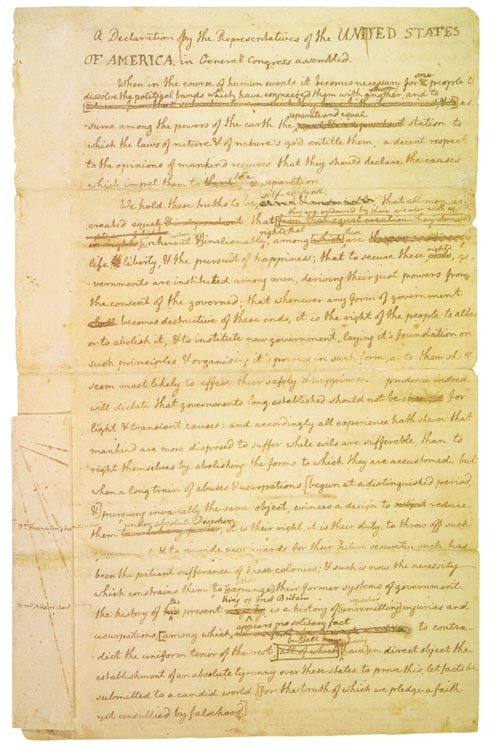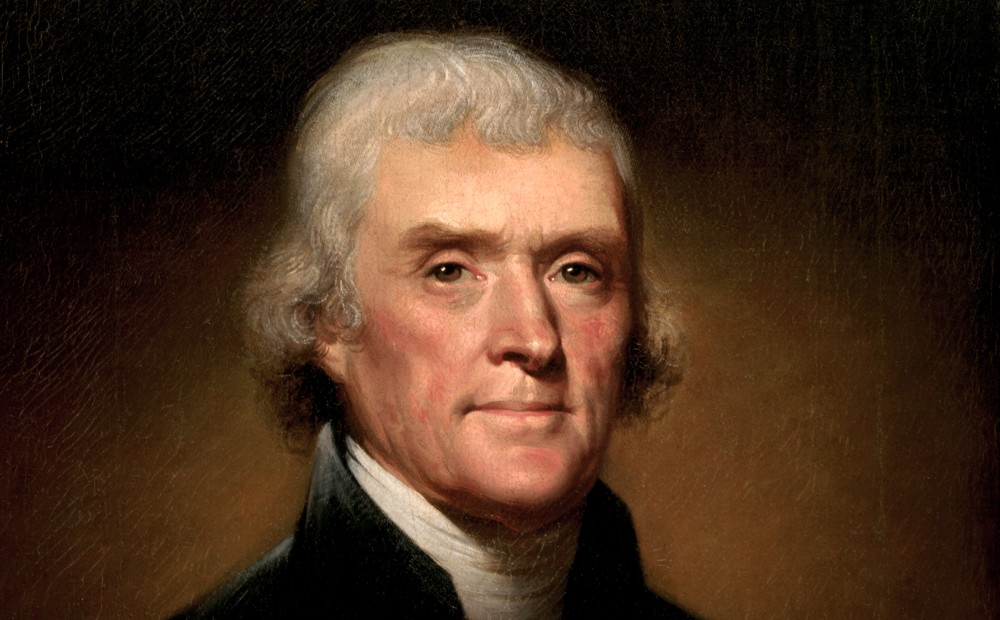
Thomas Jefferson and the Declaration
It can be lost, and it will be, if the time ever comes when these documents are regarded not as the supreme expression of our profound belief, but merely as curiosities in glass cases. Harry Truman
 On June 11, 1776, the second Continental Congress appointed a committee to write a declaration of independence. John Adams, Benjamin Franklin, Thomas Jefferson, Robert R. Livingston, and Roger Sherman were elected to the committee. One of these five was a renowned writer. For nearly thirty years, only the Bible outsold Benjamin Franklin’s Poor Richard’s Almanac, and his articles made the Pennsylvania Gazette the most successful newspaper in the colonies. But Franklin declined to draft the declaration, supposedly due to poor health, so the committee asked the thirty-three year Thomas Jefferson to draft the document.
On June 11, 1776, the second Continental Congress appointed a committee to write a declaration of independence. John Adams, Benjamin Franklin, Thomas Jefferson, Robert R. Livingston, and Roger Sherman were elected to the committee. One of these five was a renowned writer. For nearly thirty years, only the Bible outsold Benjamin Franklin’s Poor Richard’s Almanac, and his articles made the Pennsylvania Gazette the most successful newspaper in the colonies. But Franklin declined to draft the declaration, supposedly due to poor health, so the committee asked the thirty-three year Thomas Jefferson to draft the document.
In less than three weeks, Jefferson presented the rest of the committee with this historic document. For the most part, the committee accepted the document as written; except that Franklin made some subtle, but important revisions. For example, Jefferson had written “We hold these truths to be sacred and undeniable,†which Franklin revised to “self-evident.â€Â Some have suggested that Franklin was pushing the text toward the analytic empiricism of David Hume, but it’s more likely that the master editor was wordsmithing for a more graceful rhythm to the words.
On June 28th, the Committee of Five reported out the declaration to Congress. They proceeded to make thirty-nine revisions, almost exclusively to the list of grievances. Although Jefferson never uttered a word of complaint; he fumed at the constant meddling.
 Jefferson reported that afterwards, Franklin told him that he had made it a rule to avoid being the draftsman of papers to be reviewed by a public body. You can almost hear the seventy year old patriarch chuckling as he gave this advice to the young Virginian. According to Jefferson, Franklin told him the following story.
Jefferson reported that afterwards, Franklin told him that he had made it a rule to avoid being the draftsman of papers to be reviewed by a public body. You can almost hear the seventy year old patriarch chuckling as he gave this advice to the young Virginian. According to Jefferson, Franklin told him the following story.
When I was a journeyman printer, one of my companions, an apprentice hatter, having served out his time, was about to open shop for himself. His first concern was to have a handsome signboard, with a proper inscription. He composed it in these words, ‘John Thompson, Hatter, makes and sells hats for ready money,’ with a figure of a hat subjoined. But thought he would submit it to his friends for their amendments. The first he showed it to thought the word ‘Hatter’ tautologous, because followed by the words ‘makes hats,’ which showed he was a hatter. It was struck out. The next observed that the word ‘makes’ might as well be omitted, because his customers would not care who made the hats. If good and to their mind, they would buy them, by whomsoever made. He struck it out. A third said he thought the words for ready money were useless, as it was not the custom of the place to sell on credit. Everyone who purchased expected to pay. They were parted with, and the inscription now stood, ‘John Thompson sells hats.’ ‘Sells hats!’ says the next friend. ‘Why, nobody will expect you to give them away. What then is the use of that word?’ It was stricken out, and ‘hats’ followed it, the rather as there was one painted on the board. So the inscription was reduced ultimately to ‘John Thompson,’ with the figure of a hat subjoined.”
Thankfully, Congress left the preamble alone. Altering the list of grievances did not dilute the earth-shaking ideas in the first two paragraphs.
In 1822, John Adams answered a query about the Declaration of Independence.
We reported it to the committee of five. It was read, and I do not remember that Franklin or Sherman criticized anything. We were all in haste. Congress was impatient, and the instrument was reported, as I believe, in Jefferson’s handwriting, as he first drew it. As you justly observe, there is not an idea in it but what had been hackneyed in Congress for two years before. The substance of it is contained in the declaration of rights and the violation of those rights in the Journals of Congress in 1774. Indeed, the essence of it is contained in a pamphlet, voted and printed by the town of Boston, before the first Congress met, composed by James Otis, as I suppose, in one of his lucid intervals, and pruned and polished by Samuel Adams.
 Jefferson himself told Henry Lee:
Jefferson himself told Henry Lee:
This was the object of the Declaration of Independence. Not to find out new principles, or new arguments, never before thought of, not merely to say things which had never been said before; but to place before mankind the common sense of the subject, in terms so plain and firm as to command their assent, and to justify ourselves in the independent stand we are compelled to take.
“We hold these truths to be self-evident, that all men are created equal, that they are endowed by their Creator with certain unalienable rights, that among these are life, liberty and the pursuit of happiness.â€Â Some claim this is the best known sentence in the English language. It was not merely a lucid interval by Thomas Jefferson. He rightly deserves enormous recognition and praise for writing an eloquent and powerful expression of this revolutionary concept, but it was an idea more universal than one man—or one generation.
As he signed below the words, “And for the support of this declaration, with a firm reliance on the protection of Divine Providence, we mutually pledge to each other our lives, our fortunes and our sacred honor,†Stephen Hopkins said “My hand trembles, but my heart does not.â€
Harry Truman called the Declaration of Independence a supreme expression of our profound belief. Let’s remember to take it out from under its glass case every time we need it.
James D. Best is the author of Tempest at Dawn, a novel about the 1787 Constitutional Convention.
 The posts are coming!
The posts are coming!


1 comment
“We need a revolution every 200 years, because all governments become stale and corrupt after 200 years.” – Ben Franklin
I think it’s about time…
[Reply]
Leave a Comment